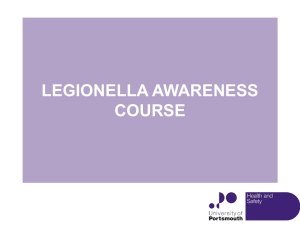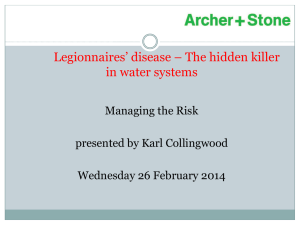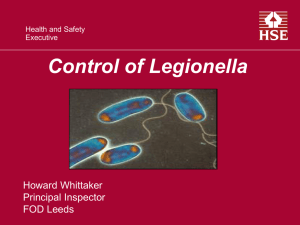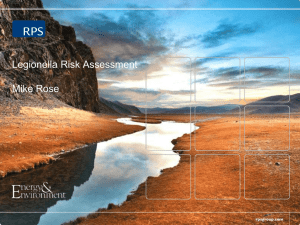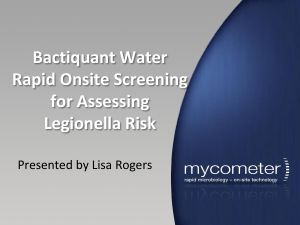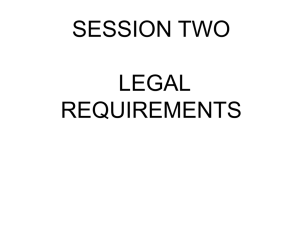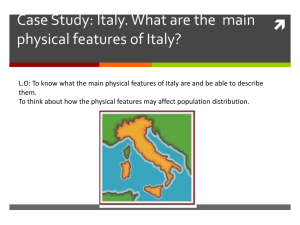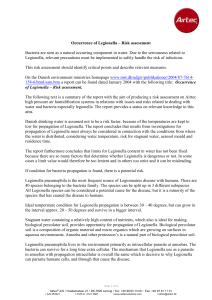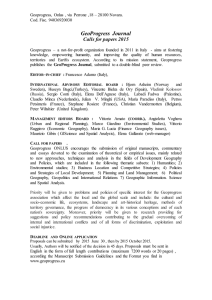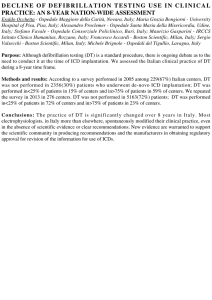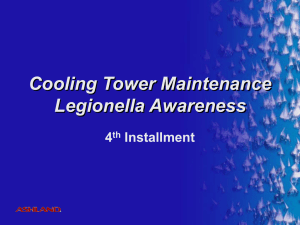Infections by Legionella: Surveillance, Prevention and Control
advertisement
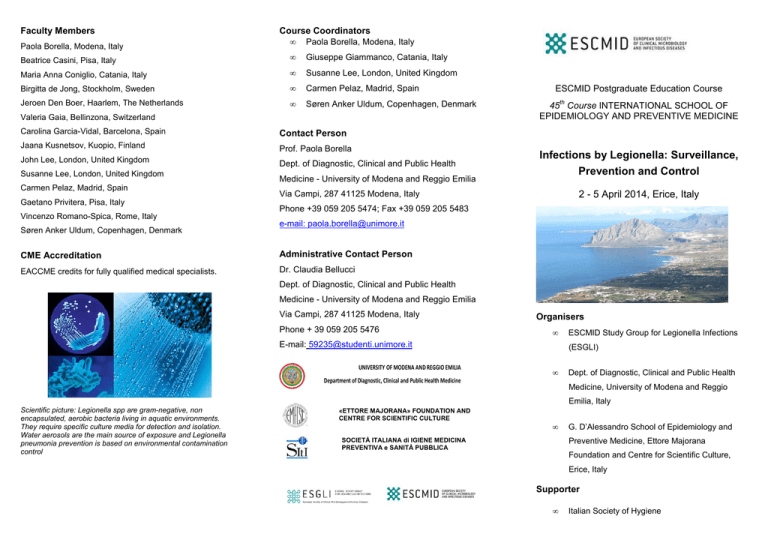
Faculty Members Paola Borella, Modena, Italy Course Coordinators • Paola Borella, Modena, Italy Beatrice Casini, Pisa, Italy • Giuseppe Giammanco, Catania, Italy Maria Anna Coniglio, Catania, Italy • Susanne Lee, London, United Kingdom Birgitta de Jong, Stockholm, Sweden • Carmen Pelaz, Madrid, Spain Jeroen Den Boer, Haarlem, The Netherlands • Søren Anker Uldum, Copenhagen, Denmark Valeria Gaia, Bellinzona, Switzerland Carolina Garcia-Vidal, Barcelona, Spain Contact Person Jaana Kusnetsov, Kuopio, Finland Prof. Paola Borella John Lee, London, United Kingdom Dept. of Diagnostic, Clinical and Public Health Susanne Lee, London, United Kingdom Carmen Pelaz, Madrid, Spain Gaetano Privitera, Pisa, Italy Vincenzo Romano-Spica, Rome, Italy Søren Anker Uldum, Copenhagen, Denmark Medicine - University of Modena and Reggio Emilia ESCMID Postgraduate Education Course th 45 Course INTERNATIONAL SCHOOL OF EPIDEMIOLOGY AND PREVENTIVE MEDICINE Infections by Legionella: Surveillance, Prevention and Control 2 - 5 April 2014, Erice, Italy Via Campi, 287 41125 Modena, Italy Phone +39 059 205 5474; Fax +39 059 205 5483 e-mail: paola.borella@unimore.it CME Accreditation Administrative Contact Person EACCME credits for fully qualified medical specialists. Dr. Claudia Bellucci Dept. of Diagnostic, Clinical and Public Health Medicine - University of Modena and Reggio Emilia Via Campi, 287 41125 Modena, Italy Phone + 39 059 205 5476 Organisers • E-mail: 59235@studenti.unimore.it UNIVERSITY OF MODENA AND REGGIO EMILIA ESCMID Study Group for Legionella Infections (ESGLI) • Department of Diagnostic, Clinical and Public Health Medicine Dept. of Diagnostic, Clinical and Public Health Medicine, University of Modena and Reggio Emilia, Italy Scientific picture: Legionella spp are gram-negative, non encapsulated, aerobic bacteria living in aquatic environments. They require specific culture media for detection and isolation. Water aerosols are the main source of exposure and Legionella pneumonia prevention is based on environmental contamination control «ETTORE MAJORANA» FOUNDATION AND CENTRE FOR SCIENTIFIC CULTURE • G. D’Alessandro School of Epidemiology and Preventive Medicine, Ettore Majorana SOCIETÀ ITALIANA di IGIENE MEDICINA PREVENTIVA e SANITÀ PUBBLICA Foundation and Centre for Scientific Culture, Erice, Italy Supporter • Italian Society of Hygiene Course Objectives Course Programme Course Programme The widespread environmental contamination and growth of legionellae in water systems and associated equipment, in both public and private buildings, represents a health risk for those exposed. Buildings which pose a significant risk, if adequate controls are not in place, include tourist accommodation, spa and health facilities. The problem can and needs to be faced by appropriate identification of risk and effective preventive and control Wednesday, 2 April 2014 Friday, 4 April 2014 14:00 Arrival and registration Management and control in community and health environments 17:00 Opening ceremony. Gaetano Maria Fara, Giuseppe Giammanco 09:00 Risk assessment and water safety plans in buildings. (Directors School of Epidemiology and Preventive Medicine, Erice, Italy) Susanne Lee 17:20 Course presentation. Paola Borella, Vincenzo Romano-Spica 09:45 Touristic accommodation: European Legionnaires’ Disease Keynote lectures Surveillance Network. Birgitta de Jong 17:30 The etiological agent: Legionella pneumophila and other 10:30 Legionella risks from spa pools, hot tubs, leisure and health Legionella spp. Valeria Gaia centres. Susanne Lee 18:30–19:00 Legionella spp, from environmental source to man: strategies, as detailed in the recent revision of the European guidelines. environmental habitats and microbial ecology. Jaana Kusnetsov The main objective of the course is to increase the theoretical and practical Thursday, 3 April 2014 knowledge and update on how to minimize the contamination and 8:50 Presentation of ESCMID and ESGLI. Jeroen Den Boer Risk factors and disease characteristics colonization of water systems by Legionella. Risk assessment of systems 09:00 Epidemiology of Legionnaires’ Disease in Europe. Birgitta de Jong and 09:20 Risk factors for environmental transmission from cooling towers surveillance, including investigations into potential sources of 11:00 Coffee break 11:30 Management and control in healthcare facilities. Gaetano Privitera, Beatrice Casini 12:00 Control and disinfection systems: innovative and conventional procedures. Maria Anna Coniglio, Paola Borella 13:00 Lunch and water systems. John Lee environmental contamination, before and after the appearance of single cases/clusters will be detailed. Clinical characteristic and diagnostic tests for detection of Legionella pneumonia will be examined. Preventive measures 09:40 Risk factors for legionellosis acquisition. Jeroen Den Boer 10:10 Diagnosis, clinical aspects and treatment. Carolina Garcia-Vidal environmental factors will be presented, together with new and traditional disinfection evidence based systems. Practical examples and exercises will be studied by small groups of participants. Younger participants aiming to reach a skilled expertise for future Problem solving on nosocomial and community-acquired cases of legionellosis. Tutors (Claudia Bellucci, Beatrice Casini, Maria Anna 10:30 Coffee break The laboratory in Legionella investigation and strategies taking into consideration both the susceptibility of persons and 15:00 Exercises (small groups) 11:00 Environmental sampling in both routine and outbreak situations. Coniglio, Greta Ferranti) 16:30 Coffee break Paola Borella, Greta Ferranti 17:00 Presentation and discussion of the work done. 11:20 Isolation of Legionella spp from environmental and biological All teachers samples. Carmen Pelaz 11:40 Comparison of tests for diagnosis of infections. 18:00 Round Table: Open issues on Legionella infections. Søren Anker Uldum All teachers involved 12:20 Molecular investigations in clinical diagnosis and epidemiology of employment in the sector are warmly invited to participate. The course aims Legionella spp. Vincenzo Romano-Spica also to expand cross working relationships and increase communication to 13:00 Lunch 19:00 Closing Ceremony 20:00 Social dinner improve the collaboration between the different professionals working in 15:00 Exercises (small groups) - Risk factors for environmental contamination by Legionella and the Legionella management, including clinicians, persons responsible for buildings, public health operators, researchers and persons involved in identification of persons “at risk”. - Sampling, isolation techniques, identification and diagnostic tests. Tutors (Claudia Bellucci, Maria Anna Coniglio, Valeria Gaia, Greta installation and maintenance of water and air distribution systems. Ferranti) 16.30 Coffee break 17:00-19:00 Presentation and discussion of the work done. All teachers Saturday, 5 April 2014 (on voluntary basis) 9:00-10:00 Projects for the Future 10:00–18:00 Visit to an archaeological site
